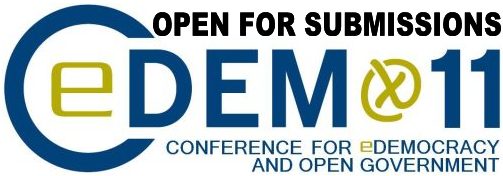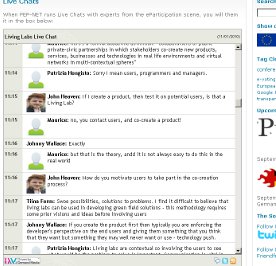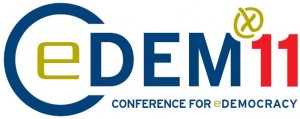Archive for the ‘Events’ Category
 |
17. December 2010 – 12:21 by Centre for E-Government
|
Very snowed in, I enjoyed it: using the title of Steve Thompson’s keynote, it was “engagingly different”!
For a full review of the conference: see the Digital Government 2.0 Blog!
Posted in Events | No Comments »
 |
15. December 2010 – 10:25 by John Heaven (TuTech Innovation GmbH)
|
Far from winding down for Christmas, this week sees a lot of European eParticipation-related activity in Brussels and Strasbourg. The launch of the eGovernment Action Plan, the presentation of the Citadel Statement and the expected adoption of regulations on the European Citizens’ Initiative by the European Parliament in Strasbourg mean that this is a busy week for European eParticipation enthusiasts.
At the “Lift Off Towards Open Government” in Brussels, Digital Agenda Commissioner and Vice President of the European Commission Neelie Kroes will launch the eGovernment Action Plan 2015. Following the launch, the conference will hear from eParticipation and eGovernment actors from the Commission and across Europe.
At the pre-conference yesterday, Geert Bourgeois (Vice Minister-President of the Flemish Government and Flemish Minister for Administrative Affairs, Local and Provincial Government) launched the Citadel Statement, a pan-European declaration that aims to identify what local government really needs to deliver on the vision set forth in last year’s Malmo Ministerial Declaration on e-government. The Citadel Statement, the result of an open discussion in which anyone could makes suggestions and vote on other people’s suggestions, is broken down into the following headings:
- Common Architecture, Shared Services and Standards
- Open Data, Transparency and Personal Rights
- Citizen Participation and Involvement
- Privacy and Identification of Individuals
- Rural inclusion
Click here for a PDF version of the full press release.
Finally, the European Parliament will vote on regulations that specify in more detail arrangements regarding the European Citizens’ Initiative. The Lisbon Treaty made provision for one million citizens to force the Commission to consider initiating legislation in any area within its remit. A recent petition online called on the Parliament to adopt “effective regulations for the European Citizens’ Initiative”; see my previous post.
Geert Bourgeois, Vice-Minister-President of the Flemish Government and Flemish Minister for Administrative Affairs, Local and Provincial Government
Posted in Events, News, Trends | No Comments »
 |
2. December 2010 – 11:49 by Centre for E-Government
|
On authors’ demand, CeDEM11 announces an extended deadline for submissions:
16 January 2011

Conference for E-Democracy and Open Government
5-6 May 2011
Krems, Austria
www.donau-uni.ac.at/cedem
Tracks
- E-Participation
- Open Data and Open Access
- Open Government
- E-Voting
Submissions
- Extended deadline: 16 January 2011
- 12 pages maximum
- Double-blind peer review
Conference Proceedings
- Print version and
- OA online version (eBook).
- Best papers will be published with the OA eJournal JeDEM
Detailed Information
Posted in Events, ICT, open data | No Comments »
 |
22. November 2010 – 17:08 by Rolf Luehrs
|
The “eParticipation” workshop is an initiative supported by the European Commission, Information Society and Media Directorate-General and will take place in Brussels, on 07 December 2010.
It aims to bring together experience and practices available in the EU and to draw lessons from the variety of projects and engage citizens and civil society alike in debating top level policy issues for the European Union. This event will take place at the right time to place eParticipation on the new political agenda of the EU, while explore its possible contribution to major political reforms throughout the EU.
Workshop topics:
• eParticipation good practice: Examples of eParticipation success stories and lessons learned, related to large scale implementations in production or pilot operation.
• eParticipation experiment design: Innovative approaches to the design of eParticipation showcases that demonstrate concrete benefits for the democratic – processes.
• Assessment of impact and comparative research. Tracking and analysis of eParticipation initiatives. MOMENTUM support action results.
• eParticipation tools and services: Practical solutions for eConsultation, ePetition, conflict resolution and mediation, eDeliberation and others.
• ICT for argumentation support: How ICT tools can support eParticipation in more dimensions than simple communication media: collaboration, content management, etc.
• Policy issues: How is the eParticipation social and legal landscape formed in Europe and elsewhere? What are the key lessons learned from the projects so far?
• Social Risk assessment: What needs to be considered in order not to undermine the fundamental social requirements associated with Democracy?
• Current eParticipation Preparatory Action project reports. The workshop welcomes announcements from the current eParticipation Preparatory Action projects (EMPOWER, EUROPETITION, U@MARENOSTRUM, VIDI, VOICES, HUWY, and WAVE).
For more information for attendees and speaker, please visit the worshop announcement on ePractice.
Posted in Events | No Comments »
 |
16. November 2010 – 17:49 by Institute for Electronic Participation
|
 This year largest eDemocracy conference in South East Europe took place during 12-14th September, 2010 in Ohrid, Macedonia.
This year largest eDemocracy conference in South East Europe took place during 12-14th September, 2010 in Ohrid, Macedonia.
The e-Democracy Conference 2010 welcomed 30 delegations from 15 countries. 100 participants from Parliaments, Governments and Official Journals, as well as representatives from international organizations, business sector and academia were engaged in fruitful and interesting discussions about the role that ICT can play into improving the democracy and transparency of the public institutions. More information about the conference is available at https://www.edemocracy.mk.
The e-Democracy Conference 2010 topics included:
- Future and emerging technologies for e-Democracy
- Compliance and standards (EU perspective)
- How to support “Green IT” initiative in the policy development
- ICT in legislative knowledge management
- How can information technology transform the way parliaments and governments work
- Interoperability in the legislative process
- Parliaments and Democracy in the Twenty-first century
- State of ICT development in Parliaments
- ICT in parliaments current practices
- e-Parliaments-The Use of ICT to Improve Parliamentary Processes
The participants at the e-Democracy Conference 2010 agreed that the progress that Macedonia has made in using ICT for improving democracy is an example that all the countries in the region should follow.
Read the rest of this entry »
Posted in Events, good practice, inclusion, members, News, Tools, Trends, Visions | No Comments »
 |
12. November 2010 – 19:34 by Francesco Molinari
|
Per chi si fosse perso la prima edizione, ecco un’altra possibilità per un week-end lungo nella bellissima Montaione, vicino Firenze, in una due giorni di “full immersion” sulla partecipazione in Europa e nel mondo.
Le “Giornate di Montaione” è una conferenza promossa e sostenuta finanziariamente dalla Regione Toscana – bella sfida in questi tempi di ristrettezze di bilancio – come un appuntamento annuale, che quest’anno si terrà il19 e 20 Novembre (vedere agenda).
La lezione inaugurale del Prof. Stefano Zamagni, dell’Università di Bologna, ci intratterrà sulle relazioni fra crescita, democrazia e partecipazione. Come d’abitudine, saranno presentati e discussi un certo numero di casi di studio da dentro e fuori Italia, selezionati dal Comitato Scientifico guidato dal Prof. Luigi Bobbio dell’Università di Torino. Una Giuria di Cittadini composta di 24 persone estratte a sorte attribuirà il premio al miglior processo partecipativo realizzato in Toscana, la prima Regione italiana (non più l’unica!!) e forse in tutta Europa ad essersi dotata di una specifica legge sulla partecipazione, quasi tre anni fa.
Un premio speciale sarà assegnato al miglior paper scritto sull’argomento da un giovane ricercatore, quest’anno il Dr. Stephen Estlub dell’Università del West of Scotland, autore di “Linking micro deliberative democracy and decision-making: trade-offs between theory and practice in a partisan citizen forum”.
Per registrarsi si può inviare una e-mail ad ufficio.partecipazione AT regione.toscana.it allegando questa scheda.
Per altre informazioni cliccare qui.
Posted in Events, News | No Comments »
 |
12. November 2010 – 19:18 by Francesco Molinari
|
For those who missed the first edition, here is another opportunity to spend a couple of days in the beautiful town of Montaione, near Florence, to talk and listen about participation in Europe and in the world.
The “Montaione Days” conference is promoted and financially supported by the Regional Government of Tuscany as a yearly appointment – quite challenging in these harsh times of budget cutoffs – this time on 19 and 20 November (see agenda).
Keynote speaker will be Prof. Stefano Zamagni, from the University of Bologna, who will explain how growth, democracy and participation, can actually be linked together. As usual, a number of case studies from inside and outside Italy will be presented and publicly discussed, as they were selected by the Scientific Committee led by Prof. Luigi Bobbio from the University of Turin. A Citizen Jury composed of 24 randomly selected people will award the best participatory process from across Tuscany, the first Region in Italy (not anymore the only one!!) and possibly in the whole Europe to have voted a specific law on participation, almost three years ago.
A special prize will be awarded to the best thematic paper written by a young researcher, this year Dr. Stephen Estlub from the University of the West of Scotland, who wrote “Linking micro deliberative democracy and decision-making: trade-offs between theory and practice in a partisan citizen forum”.
To pre-register send an e-mail to ufficio.partecipazione AT regione.toscana.it using this form.
To get more information (sorry, in Italian) click here.
Posted in Events, News | No Comments »
 |
1. November 2010 – 15:46 by John Heaven (TuTech Innovation GmbH)
|

Living Labs Live Chat
Today saw another PEP-NET Live Chat, this time on the topic “Living Labs”. Experts from across Europe, all of whom are partners in the PARTERRE project, discussed their experiences. (For details, see my previous post.)
We aimed to give people who aren’t so familiar with the Living Labs approach a deeper understanding of what the concept is. After all, you often hear the term when conversation turns to European projects.
What is a “Living Lab”?
It’s a way of involving users in the design process for new products and services — and when I asked whether the concept is user-centric, the answer was a resounding “yes”. It is not simply a test-bed, i.e. taking a finished product and testing it on a group of users; it’s much more about empowering a community of users to solve a problem that affects them. The theory is that because they are the people who will be using the product or service, they know best what they need. They will need help from developers to know what technology is capable of, but the Living Lab environment should allow users to retain as much control as possible. This is a reversal of what happens when people develop something that they think solves other people’s problems. (This isn’t just technology developers — I’m sure we have all done that in one way or another.) Even the term “user” was viewed with scepticism by some: the LL approach is all about creating a community that transcends the usual barriers between users and product developers.
How to set one up?
Read the rest of this entry »
Posted in Events, Projects, Trends | 5 Comments »
 |
21. October 2010 – 15:29 by Centre for E-Government
|
Call for Papers
During the last 10 years, the world has focused on social media and the new forms of societal behaviour, including content generation, collaboration and sharing as well as network organisation. These behaviours and expectations, in particular transparency and access to data, new ways of interacting with government and democratic institutions will continue to develop, and profound changes in society are to be expected. Society has been confronted with Open Government, Open Data and Open Access. What have the experiences been so far? How do these impact society, democratic structures and organisations? What changes occur at citizen level? What are the implications for democracy, society, science and business?
The Conference for E-Democracy and Open Government - CeDEM11 – presents the following Tracks (Submission Deadline: 1 Dec. 2010):
E-Participation
- Julia Glidden (21C Consulting, UK)
- Jeremy Millard (Danish Technological Institute, DK)
- Norbert Kersting (Stellenbosch University, ZA)
Open Government
- Philipp Müller (University of Salzburg, Business School, AT)
- Axel Bruns (Queensland University of Technology, AUS)
E-Voting
- Melanie Volkamer (Technical University Darmstadt, GER)
- Thad Hall (University of Utah, USA)
Open Data and Open Access
- Andy Williamson (Hansard Society, UK)
Location: Danube University Krems, Austria
Date: 5-6 May 2011
Further Information at the Conference Website:
https://www.donau-uni.ac.at/cedem
DEADLINE for SUBMISSIONS: 1 December 2010
Posted in Events | No Comments »
 |
13. September 2010 – 10:00 by Centre for E-Government
|
For the ePart10 in Lausanne, Peter Cruickshank and I wrote about lurkers and their role in e-participation, to be precise, it was about signing an e-petition as a transition from lurking to participation.

Not the sort of lurker we’re talking about
We were thinking about the challenges that lurkers present to us as e-participation researchers, and to the democratic process in general: is being ‘a face in a crowd’ at a political demonstration a bad thing? (no) and is it similar to lurking online? (yes). After all, just spending time at a demonstration or following a political topic is still a commitment. Therefore lurkers are interesting to us in their own right, and should not be negatively portrayed. Lurkers are better than ignorers after all.
We can’t expect everyone to be an activist (the 90-9-1 rule); but if we can understand their motivations to lurk, and what could motivate people to start taking (online/offline) action by the simple act of signing a petition that’s even better, broadening the pool of available activists.
There’s already a huge body or research into the psychology of online participation – all we’ve tried to do here is link them to one specific e-participation technology, and suggest some implications for future research.
You can download the presentation via this link.
Any comments or hints about any research on lurkers& lurking in e-participation is welcome!
Posted in Events | 4 Comments »











